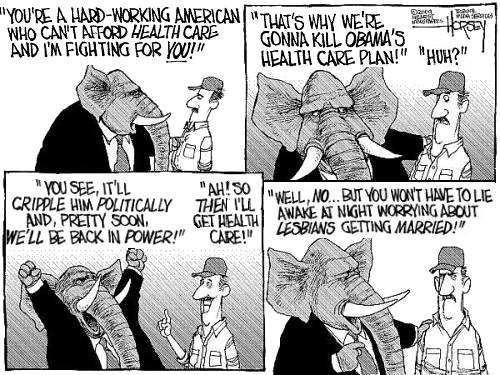This week I've been asked to explain why conservatives won't admit that George W. Bush "broke" the United States of America. It's an interesting question, so open-ended it's difficult to choose the way to answer it.
The short answer is they won't admit it because it's not true. George W. Bush did not break the country. Many conservatives believe history's judgment will be much kinder to him and his accomplishments than the current crop of historians and commentators allow and that he will eventually be seen in a much better light than he is today.
....
Critics on the left blame Bush for a decline in America's global prestige and connect it to his foreign policy. I would like to point out that his clear-minded prosecution of the war on terror resulted in Libyan leader Muammar al-Qaddafi's giving up his nation's nuclear weapons program, among other things. Barack Obama's make-nice approach got us a book accusing the United States of being a neo-colonial bully from Venezuelan strongman Hugo Chavez. I know which outcome I prefer
...
Events proved these concerns were, at least in part, justified. Fred Barnes, writing in the Weekly Standard in 2005, just about a year after Bush was reelected, cited six reasons they were, starting with the fact that Bush was not, in fact, a conventional conservative.
"He deviates on the role of the federal government, on domestic spending, on education, on the Medicare prescription-drug benefit, and on immigration," Barnes wrote. And by "deviates" Barnes meant favoring an expanded role for the federal government, counter to the limited-government philosophy of the Reaganite Republican Party
.....
But Bush gets credit for his pursuit of tax cuts that, rather than create the economic mess we are currently in, helped fuel economic growth. Under Bush, the economy and the stock market strengthened from 2003 to 2007 following the reduction in the capital gains tax from 20 to 15 percent and the tax on dividends was reduced from 35 percent to 15 percent.
Following the 2006 elections, when the Democrats regained control of Congress, it became clear that the House and Senate would not continue the lower rates. The response by investors to the promise of higher dividend and capital gains taxes started the decline in the stock market.
To those who understand the relationship between government and the economy it is no wonder that private investors, faced with these two near-certainties, changed their behavior. It's similar to the relationship between the realization that there were enough votes in Congress to pass the Smoot-Hawley tariff increase and the onset of the Great Depression. The stock market is a leading, not a lagging indicator.
....
Many conservatives opposed, as one wrote recently, "the idea that we would be able to bail out various financial institutions with taxpayer money, thereby stabilizing markets and mitigating losses while instilling confidence among investors and the general public."
As we now all know, it didn't work -- under Bush, who conceived it, or under Obama, who expanded it. And it opened the door for an unprecedented -- in my lifetime anyway -- level of intervention by the White House in American business.
....
Those who blame Bush for the bursting mortgage bubble overlook his efforts to bring greater regulation to Fannie Mae and Freddie Mac and the way congressional leaders like Rep. Barney Frank, D-Mass., and Sen. Christopher Dodd, D-Conn., interposed themselves between the White House and efforts at reform. Could Bush have done more? Maybe, but he's also not solely to blame.
The "blame Bush" approach also ignores the way the Clinton-era revisions to the Community Reinvestment Act and pressure from the Department of Housing and Urban Development, again during the Clinton presidency especially, led to an increase in the number of people being given home mortgages who really never should have gotten them.
Why can't conservatives admit George Bush broke America? | Salon

